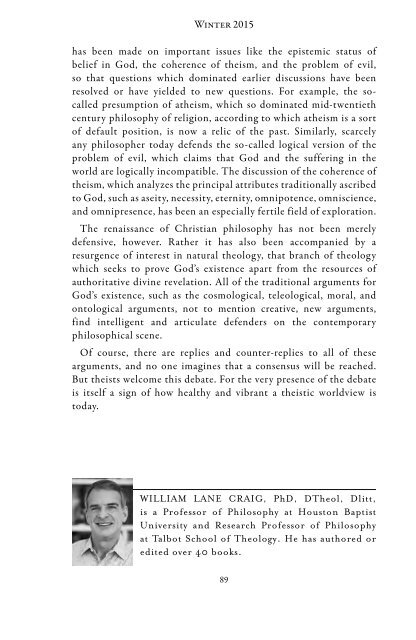THE CITY
h6c7p5d
h6c7p5d
You also want an ePaper? Increase the reach of your titles
YUMPU automatically turns print PDFs into web optimized ePapers that Google loves.
Winter 2015<br />
has been made on important issues like the epistemic status of<br />
belief in God, the coherence of theism, and the problem of evil,<br />
so that questions which dominated earlier discussions have been<br />
resolved or have yielded to new questions. For example, the socalled<br />
presumption of atheism, which so dominated mid-twentieth<br />
century philosophy of religion, according to which atheism is a sort<br />
of default position, is now a relic of the past. Similarly, scarcely<br />
any philosopher today defends the so-called logical version of the<br />
problem of evil, which claims that God and the suffering in the<br />
world are logically incompatible. The discussion of the coherence of<br />
theism, which analyzes the principal attributes traditionally ascribed<br />
to God, such as aseity, necessity, eternity, omnipotence, omniscience,<br />
and omnipresence, has been an especially fertile field of exploration.<br />
The renaissance of Christian philosophy has not been merely<br />
defensive, however. Rather it has also been accompanied by a<br />
resurgence of interest in natural theology, that branch of theology<br />
which seeks to prove God’s existence apart from the resources of<br />
authoritative divine revelation. All of the traditional arguments for<br />
God’s existence, such as the cosmological, teleological, moral, and<br />
ontological arguments, not to mention creative, new arguments,<br />
find intelligent and articulate defenders on the contemporary<br />
philosophical scene.<br />
Of course, there are replies and counter-replies to all of these<br />
arguments, and no one imagines that a consensus will be reached.<br />
But theists welcome this debate. For the very presence of the debate<br />
is itself a sign of how healthy and vibrant a theistic worldview is<br />
today.<br />
WILLIAM LANE CRAIG, PhD, DTheol, Dlitt,<br />
is a Professor of Philosophy at Houston Baptist<br />
University and Research Professor of Philosophy<br />
at Talbot School of Theology. He has authored or<br />
edited over 40 books.<br />
89


